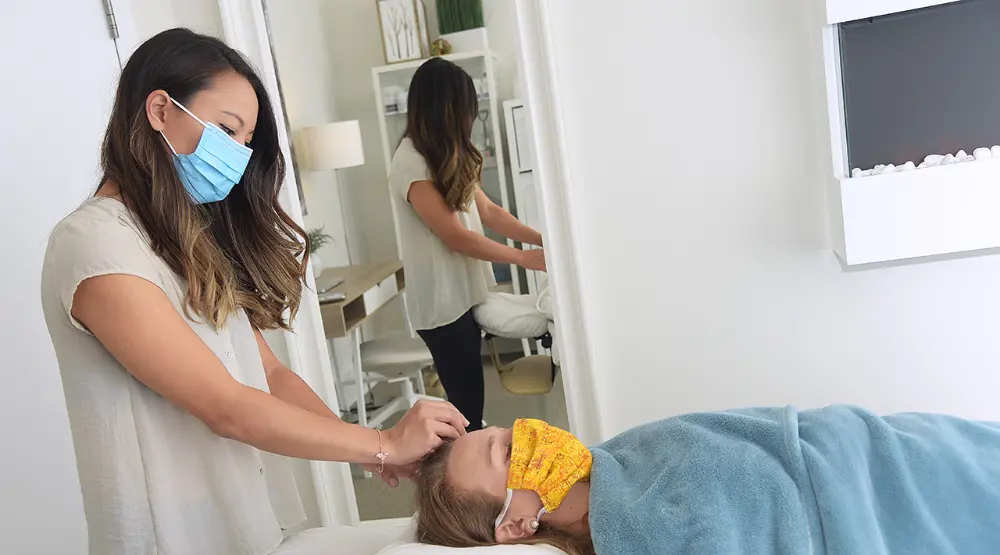
56 – Navigating a Cyclical Rollercoaster with Dr. Jasmine Bray-Mak
- Safe Harbour Therapy Centre
Subscribe: Apple Podcasts | Google Podcasts
So often I have heard women say
“One week I feel great! I’m optimistic, motivated and get everything done like super woman, then the next week I’ll feel like a completely different person. I’m exhausted, everything hurts, I can’t show up for things, I don’t feel like myself and I don’t have the capacity to handle any of it.”
I’m here to tell you that it doesn’t have to feel this way; while this is common, it is not “normal”. The up and down rollercoaster is an imbalance and your body is trying to tell you something. Your body is a part of you and it should be working with you, not fighting against you.
During the first half of your menstrual cycle, estrogen levels rise in order to thicken the uterine lining and create a safe and happy home for a potentially fertilized egg, should pregnancy occur. After ovulation, if pregnancy doesn’t occur, estrogen rapidly declines. Along with this decline in estrogen, there is a drop in the neurotransmitter, serotonin, which is important for making us feel good. If the drop in estrogen happens too fast or too slow, we’ll see different symptoms which can help your Naturopath paint a picture of what may be going on for you.
From another perspective, progesterone is the dominant hormone in the second phase of your menstrual cycle. It stays fairly low in the first half and after ovulation, rises and falls similar to a bell curve, dropping off right before your period begins for the next cycle. If progesterone is not rising enough, or is too low in comparison to estrogen levels, an array of physical and emotional symptoms can ensue.
Other hormones that contribute to the cyclical changes that may need to be consider for a full understanding of what’s going on include GnRH, LH, FSH, Testosterone, DHT, DHEA, cortisol, and thyroid hormones.
Our hormones are powerful and like everything else in our body, need to be maintained in a proper balance – both within their own normal range, and in comparison to the other hormones at play. Even if your estrogen levels are normal, we need to consider the estrogen to progesterone ratio to see if the two are dancing well together. Given that these imbalances can be easily disturbed by stress, environmental toxins, nutritional deficiencies, poor digestive function, alcohol consumption, reduced physical activity, exogenous hormones like the birth control pill or hormonal IUD, lack of sleep and so many other factors, it’s important to be aware of your body and listen to what it’s trying to tell you.
Hormone imbalances can show up with so many different signs and symptoms. If any of the following resonate with how you feel on a monthly basis, and seem to go away with your period, it may be time to take a deeper look into your hormone levels.
| Sleep Irregularities Mood Swings Emotional Sensitivity Irritability Low Mood/Depression Anxiety |
Brain Fog Difficulty Concentrating Extreme Fatigue Low Libido Hot Flashes Night Sweats |
Breast Tenderness Bloating Water Retention Cravings Adult Acne Irregular Periods |
Spotting throughout Cycle Heavy Periods Missing Periods Painful Periods Pain/Cramping Migraines/Headaches |
Conditions that can be associated with hormone imbalances include
| PCOS Ovarian Cysts Endometriosis Adenomyosis Amenorrhea (missing periods) Menorrhagia Metrorrhagia |
PMS PMDD Adult Acne Uterine Fibroids Breast Cancer Infertility Migraines |
Recurrent Pregnancy Loss Hypothyroidism Hyperthyroidism Menopause Perimenopause Cortisol Dysregulation |
Naturopathic Doctors look at every aspect of your health, consider all the symptoms that show up for you and can order comprehensive testing and bloodwork to help determine the root cause of your problems. We use dietary modification, clinical nutrition and supplementation, lifestyle modifications, botanical medicine, homeopathy and acupuncture to help bring things back into a healthy balance. We listen to you and what your body is trying to say. Our philosophy is to treat support the body naturally with individualized options for treatment, and explain how to prevent recurrence once you find your balance. Your body knows how to heal and how to sustain an equilibrium when given the right support.
Until you have a chance to dive deeper, here are some things that you can start on:
- Track your cycle and symptom
- Drink water, watch your alcohol consumption, sweat regularly, eat well and get a good nights sleep
- Notice your stress levels, how you cope with them, and take a time out every day to take care of yourself
- Know your patterns and schedule for it
Dr. Jasmine Bray-Mak, ND
